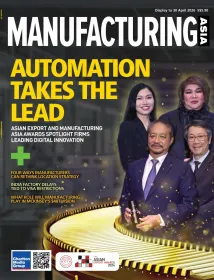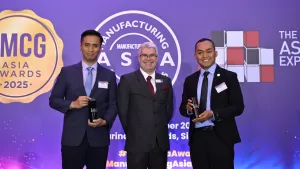
Cheng Yuan explains why firms should strengthen fundamental and consideration for collaborations with regional partners
Companies should focus on organic growth and enhancements before collaborating with regional partners, she said.
RSM Partner, Chong Cheng Yuan, is one of the judges at this year’s Asian Export Awards. Cheng Yuan draws on more than 20 years of combined audit experience in Singapore, Malaysia, and New Zealand to help businesses grow. She now leads RSM Singapore’s Industrial Manufacturing practice, helping clients in due diligence and reporting accountant assignments for initial public offerings on the Singapore Exchange (SGX).
Prior to joining RSM, Cheng Yuan led as a lead audit director at one of the Big 4 firms in Singapore. Besides audit services, she amassed experiences in quality review of listed entities, multinational corporations, and in IPO projects. She also oversaw internal practice reviews within the Southeast Asia region, handled external regulators, oversaw policy compliance matters, and provided training.
Speaking with Manufacturing Asia, Cheng Yuan talked about current trends that are shaping Asia’s export industry, latest business strategies, and why companies should carefully consider their collaborations with regional partners.
What are the current trends that are shaping Asia Pacific's export industry?
Globalisation has slowed down due to the rise of protectionism that imposes constraints which disrupt the supply chain. Another major business disruptor is the relentless pandemic that shifted the economy toward more service-oriented businesses such as IT, legal, and other professional services.
We are expecting the diversification of supply chains toward reshoring production of core products. We are also anticipating a shift toward sustainability through energy-efficient manufacturing. Pandemic-imposed restrictions have pushed companies to digitalise, and the pace of digitisation has fast forwarded by a few years over the past two years.
Asia-Pacific exports will remain buoyant especially with China’s strong growth forecast and intra-regional trades in Asia. Another observation is that the electronics sector is still expanding as the pandemic has opened up business opportunities in manufacturing more electronic products such as track-and-trace devices. Other potential sectors with good, perceivable prospects include food and commodities sectors in the export market.
With markets recovering from the crisis, where are the opportunities now for exporters and manufacturers?
Exporters and manufacturers should seize the opportunities to grow, expand, and digitalise by partnering government agencies such as EDB, and tap on available grants and government assistance. Digitalisation can help companies to be more agile and adaptive toward changes, while developing a robust supply chain can help minimise disruptions to production.
Another area that companies should consider is sustainability. Sustainability reduces business costs by improving resource efficiency, future-proof business for sustainability-centred regulations and industry trends, enhances the company's brand reputation, and secure future earnings through stakeholder loyalty and advocacy.
What strategies and innovations can exporters leverage in order to expand their business reach? How can companies expand or develop new export markets?
Some of the prevailing initiatives that can enhance business reach and help companies grow include digitalisation, strengthening of human capital, and collaborations with regional partners. Companies should also focus on organic growth and enhancements before they are ready to collaborate with regional partners for further growth and penetrate new markets.
As businesses digitise, how can exporters and manufacturers be on board the digital trade era? What should they do to mitigate the risks that come with transformation?
Exporters and manufacturers have to assess their firms’ digitalisation readiness and start small by first identifying areas where digitisation can help automate and streamline for greater efficiency. They also have to understand that digitalisation is an on-going process that spreads over a long period of time and not a one-off IT project. Employees will have to learn, re-learn, and acquire new knowledge and skill sets to make it work. All these will help mitigate adverse transformation risks.
As a judge in the Asian Export Awards, what key criteria have you considered in selecting the winners?
Key areas we should consider are their sustainability and digitalisation efforts, where the former is front facing and the latter is organic. Both are unique to every company and are equally crucial. These, when properly executed, will enhance a company’s product unique selling point (USP). A point to be taken is that USPs should be aligned with the company’s sustainability efforts as part of the company’s strategy formulation process. Another judging criteria is based on how the participant goes to the market with a feasible strategy.
















